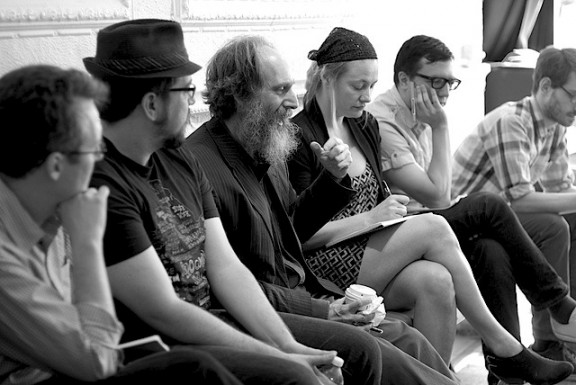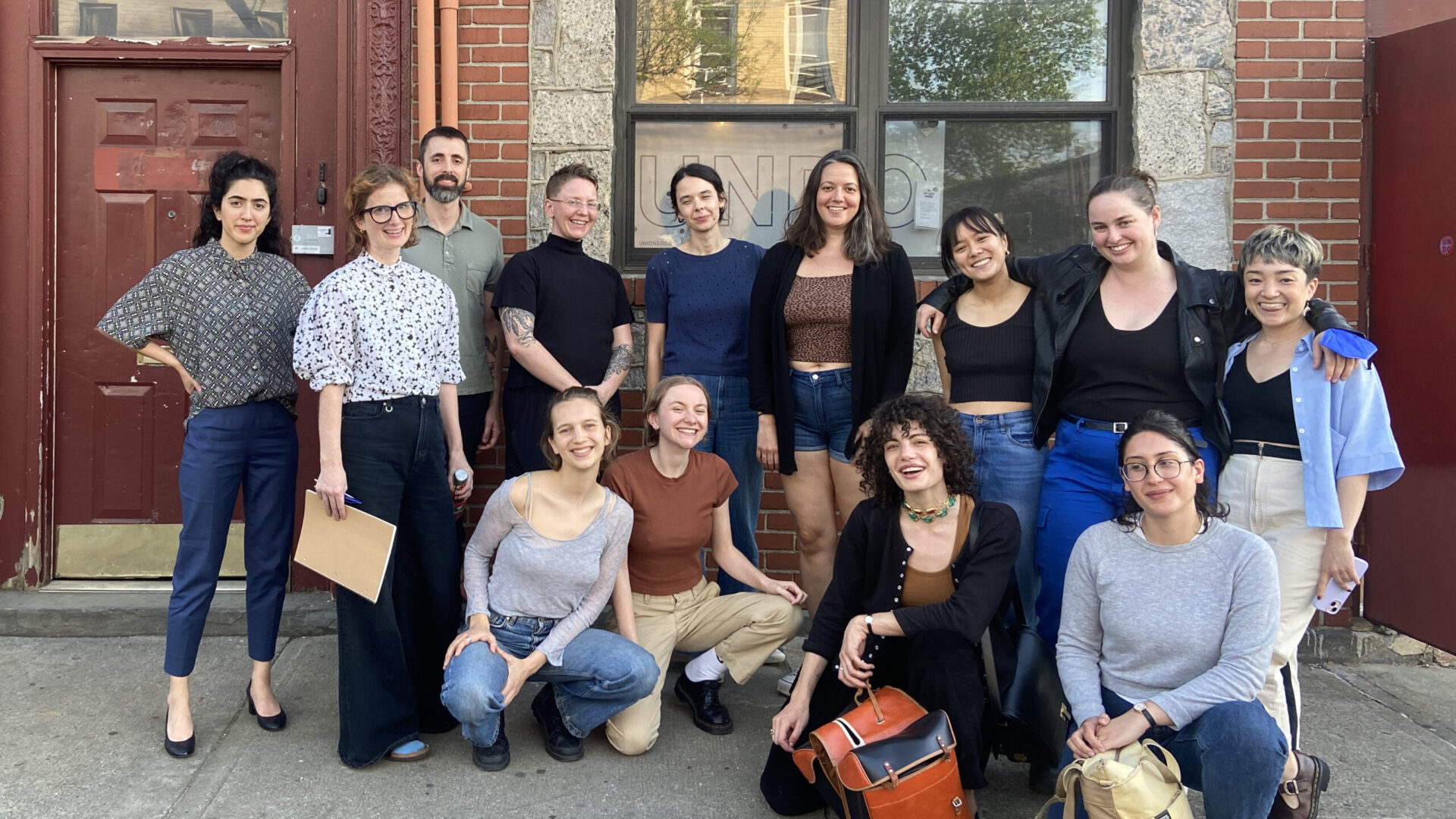This is an edited transcript from a panel held May 8th at UnionDocs Purchase on Documentary Criticism.
The past decade witnessed an explosion of documentary film production, but this growth has not been met by a reciprocal increase in documentary criticism. Richard Brody (New Yorker), Ed Halter (Light Industry), Thom Powers (Toronto International Film Festival, DOC NYC, Stranger than Fiction), Lisa Rosman (New Deal Sally), Aaron Hillis (GreenCine Daily, Benten Films), and Karin Chien (dGenerate Films) discussed the challenges of getting documentaries critically reviewed and brainstormed solutions during this lively panel.
Karin Chien:
I think I was invited to the panel today not because I’m an expert in documentary criticism but because it’s played a huge role in the growth of our company. The perspective I can bring is mainly from a bigger picture market perspective. As a producer and a distributor, I can say that criticism really factored into our business plan. I’m working with films that have never been shown in the US. Some of them have gone—films like Petition which had gone to Cannes but don’t premiere anywhere in the states. There’s a lack of communication between the US and China in terms of the industries. There’s nobody in the US looking at films in China, so there’s no information or knowledge about how to get the films over here. A lot of these films are really fantastic. It’s the only free media coming out of China today. The only uncensored content is these independent documentaries.
When we started building our company, we thought: How do we get these films out there? It’s our job not only to sell these films but create a market for them. The main way we decided to do this was through criticism. So how do we get these films in front of the critics? Because some of them are too old to play at festivals– They’re not going to get a theatrical release. They’re Frederick Wiseman-esque documentaries in a foreign language. They’re not going to come out in theatres. What we did is we started to build our own base of critics who we would contact to write pieces about these films. And right now we have a website, we have daily updates and entries and it’s kind of become the go-to site for Chinese cinema. And it’s because we’re employing writers and bloggers and critics and also sourcing other material and putting it on our site really just as a service, really just as an information service for our readers, for our audience.
In that way the criticism has played a key role in getting the films out there. We don’t do any other advertising. We have very little money to do any marketing, so it’s really all criticism. Later I can talk about a case study. There was a film that we distributed called Ghost Town, by Zhao Dayong. It premiered at the New York Film Festival last fall. That film, we have pictures of when it played at MOMA last month, lines going up the elevator and to the mezzanine, and it’s all due one hundred percent to the criticism that came out.
Thom Powers:
I wrote this essay in 2008, called “Wanted: Documentary Critics”, which you can find on the Stranger Than Fiction website. The basis of that was that I felt that the output of documentary film, which has grown so rapidly in the past ten years, had far outpaced the critical attention being paid to it — to the extent where I feel like there’s an opening now for people to specialize in documentary criticism. This opens up a conversation amongst critics whether specialization is good or bad. I don’t really have a stake in that, I think that it’s valuable to read people who don’t specialize. But I think it would be valuable to have—because we barely have it right now—would be valuable to have people who are staking out this terrain for expertise.
I know because it’s my job as a festival programmer to watch several hundred documentaries each year. I’ve seen a lot more work than is represented in what I read about. There are some other trends that we can talk about later, but one trend, though, just to throw out there, is that I think a lot of the people who are writing about documentaries today are doing it in a very sympathetic way. They recognize documentaries are—it’s a hard slog, there’s not a great market. So when they step up to write about a piece, it’s usually a rah-rah piece. Which, god knows, filmmakers appreciate. But we also need real criticism. We need writers who are able to put films in context of the larger body of work that’s out there, and also write critically about them, not just favorably.
It was interesting when I wrote this piece and I heard from filmmakers like Alex Gibney or Michael Tucker. They both, for example, talked about how much they appreciated reading criticism of their work even when it was critical. They may not appreciate it in the moment, on Friday when their film is opening, but with a little bit of distance they appreciated what it had to say. I think that all filmmakers crave not only the ability to make a living off their work—none of us who are getting into this are doing it because we thought we were gonna make a great living. We got into it because we had something else to say. We wanted to have some engagement with the world. And I think criticism is part of that engagement. I think filmmakers as much as they’re starved for money in this profession are also being starved of good feedback. So, I’ll let they others continue and we can come back to some of these ideas later.
Aaron Hillis:
I have a lot of opinions about documentary. To elaborate on what Thom was saying, I absolutely think criticism is important when it comes to documentaries. I’ll back up. I see a lot of documentaries throughout the year. I have to admit I have a lot of frustrations with a lot of them that I see. I feel that the subject matter is compelling. There are a lot of fascinating, great stories that need to be told out there, but then the medium itself is not respected. It’s not cinema. It’s about conveying information but it isn’t told in a filmic way. I think a lot of times when people do write about documentaries, they tend to focus on the content but not on the film part of it, which I think is really important and needs to happen a lot more.
I also think that context is so incredibly important, especially for—you know, there have been such a slew of social activist docs talking about issues that, you know, they get you excited in the moment. Yeah, yeah, I don’t want to see those dolphins get slaughtered! But then you come out of the movie and you can have conversations about it and then you go back to watching your American Idol and having dinner. It doesn’t really transcend the filmic medium. I feel like there’s a lot of impotence in those kinds of docs even when they are heartfelt issues. I absolutely think that critics need to be addressing all of these things and more.
Documentary is more than just a genre. It’s more than just a sci-fi film. There’s a real life connection that I don’t think is addressed enough in film writing. I end up writing about a lot of documentaries each week for some of my freelance outlets. These are concerns I have and I can’t always get to them in a capsule length, if I can’t go further. I mean I really think the last decade has been one of the most interesting times for documentaries for a lot of reasons. This has been a time when the medium has really been stretched and interested things have happened. You have hybrid docs, things that you can’t really categorize easily. It’s exciting. Someone needs to be addressing these. It’s important for the filmmakers and important for the community and the medium itself. Ramble done.
Richard Brody:
Hi, I’m Richard Brody. I edit the movie listings at the New Yorker where I write capsule film reviews, a DVD column, and the blog The Front Row. I’ve written the book Everything is Cinema, which is a critical biography of Jean-Luc Godard. Nobody who is in any way Godardian lacks interest in documentary. Godard is only one of the French new wave filmmakers who started his career with documentary, and who continued to work in one way or another in some documentary-related format.
And yet, I think there’s something a little peculiar about even our presence here besides its intrinsic social value. Steve invited me to join the panel, and anything Steve suggests is good with me. And then, a couple of weeks later, he sent me the list of everyone who was gonna be here. I saw Thom was gonna be here, and I said, Oh shit! I’m just gonna be yelled at by Thom for not writing about enough documentaries. [laughter]
I actually do like documentaries. But I don’t—exactly as Aaron said, I don’t think of documentary as a genre. I very much enjoyed Colin’s introductory remarks in which he used the word ‘non-fiction.’ I think non-fiction is a valid way to describe a work of art, whether in writing or in film. But it’s not only not a genre, it’s hard to distinguish it from fiction except in certain very general and practical ways. I think there’s, exactly as Tom said, an incredible flood—he didn’t quite use the word flood, but, there’s an incredible amount of documentary films being made and shown. Of course critics can’t keep up with them, because there are too many documentaries being made and being shown. This is in part the fault of the digital camera. I think there should be a law that if you’re over twenty-five, and have an income over some fairly small level, you should have to shoot in 35mm. [laughter] Because that would help filmmakers actually think about what they’re shooting when they shoot.
There’s simply an absence of thought prior to pressing the button in many, many, many documentaries that I see. That said, the idea of specializing as a critic in documentary seems extremely peculiar to me. I can’t imagine a book critic specializing in non-fiction or fiction. I can imagine having a strong interest in one rather than the other. But I don’t think a book critic would have a career specializing, and I don’t think a film critic should have a career [specializing], except perhaps as a kind of encyclopedia writer. If you want to know about all the documentaries that have been released in the past decade, maybe there would be one go-to nudnik who would have actually seen everything. [laughter]







This is a great document of a great discussion & I want to thank UnionDocs for sharing it.
Pingback: Underground Film Links: May 22, 2011 | Bad Lit